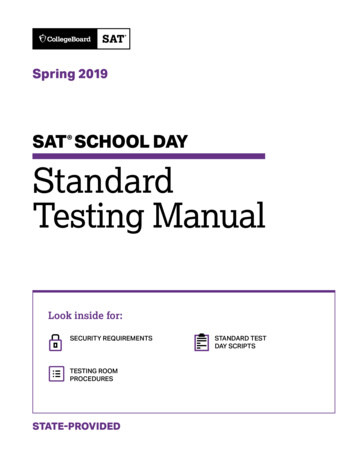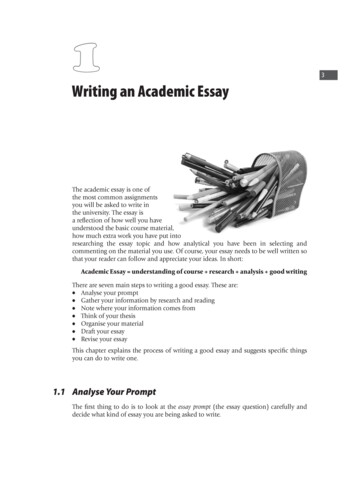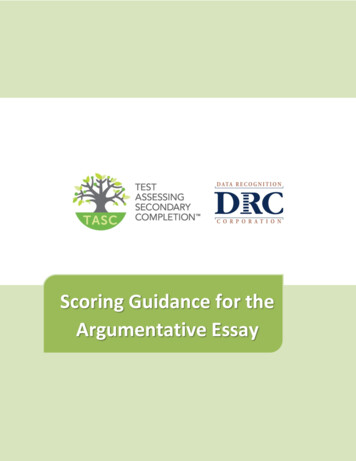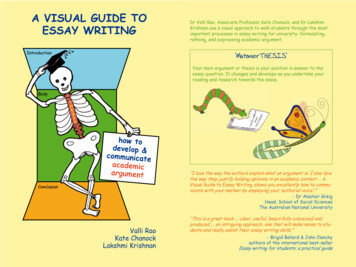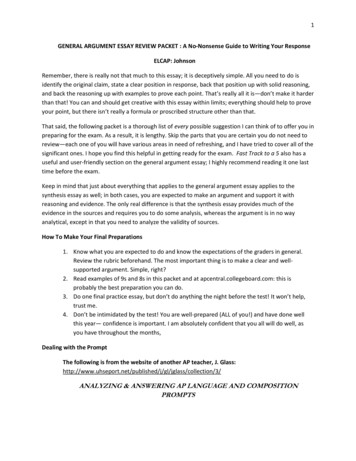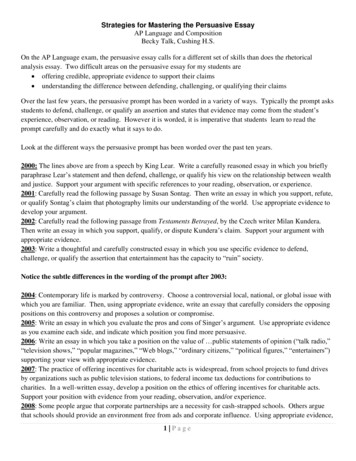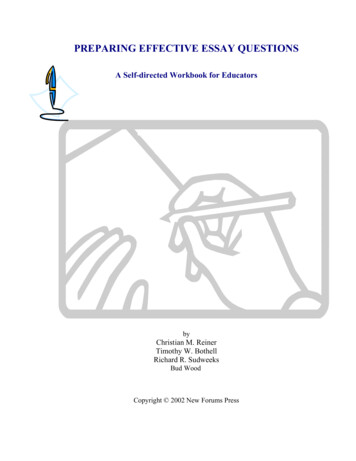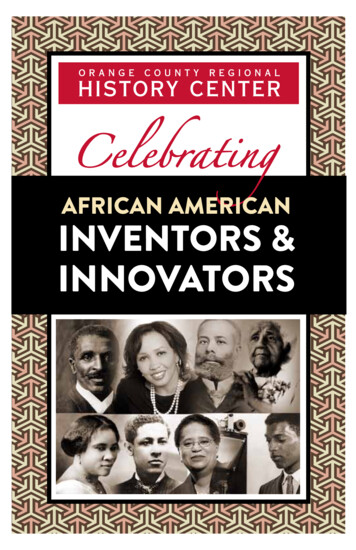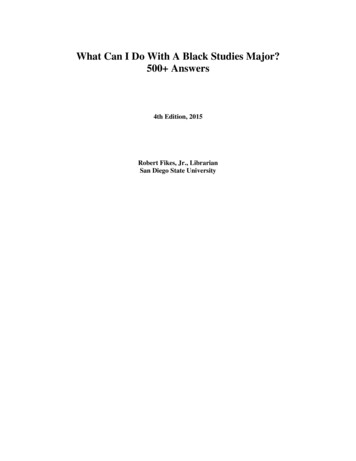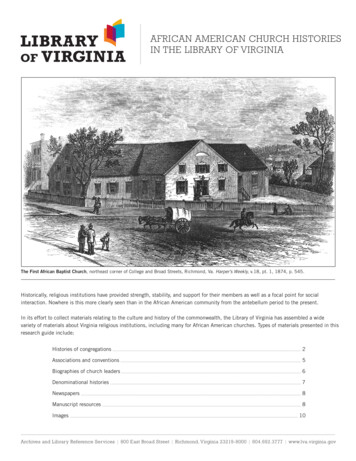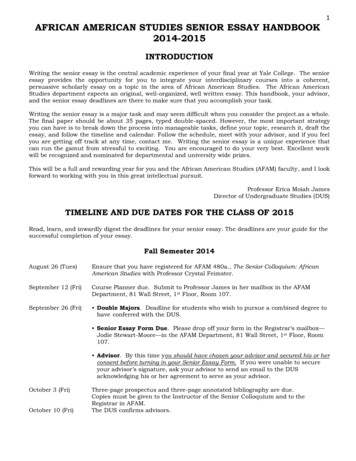
Transcription
1AFRICAN AMERICAN STUDIES SENIOR ESSAY HANDBOOK2014-2015INTRODUCTIONWriting the senior essay is the central academic experience of your final year at Yale College. The senioressay provides the opportunity for you to integrate your interdisciplinary courses into a coherent,persuasive scholarly essay on a topic in the area of African American Studies. The African AmericanStudies department expects an original, well-organized, well written essay. This handbook, your advisor,and the senior essay deadlines are there to make sure that you accomplish your task.Writing the senior essay is a major task and may seem difficult when you consider the project.as a whole.The final paper should be about 35 pages, typed double-spaced. However, the most important strategyyou can have is to break down the process into manageable tasks, define your topic, research it, draft theessay, and follow the timeline and calendar. Follow the schedule, meet with your advisor, and if you feelyou are getting off track at any time, contact me. Writing the senior essay is a unique experience thatcan run the gamut from stressful to exciting. You are encouraged to do your very best. Excellent workwill be recognized and nominated for departmental and university wide prizes.This will be a full and rewarding year for you and the African American Studies (AFAM) faculty, and I lookforward to working with you in this great intellectual pursuit.Professor Erica Moiah JamesDirector of Undergraduate Studies (DUS)TIMELINE AND DUE DATES FOR THE CLASS OF 2015Read, learn, and inwardly digest the deadlines for your senior essay. The deadlines are your guide for thesuccessful completion of your essay.Fall Semester 2014August 26 (Tues)Ensure that you have registered for AFAM 480a., The Senior Colloquium: AfricanAmerican Studies with Professor Crystal Feimster.September 12 (Fri)Course Planner due. Submit to Professor James in her mailbox in the AFAMDepartment, 81 Wall Street, 1st Floor, Room 107.September 26 (Fri) Double Majors. Deadline for students who wish to pursue a combined degree tohave conferred with the DUS. Senior Essay Form Due. Please drop off your form in the Registrar’s mailbox—Jodie Stewart-Moore—in the AFAM Department, 81 Wall Street, 1st Floor, Room107. Advisor. By this time you should have chosen your advisor and secured his or herconsent before turning in your Senior Essay Form. If you were unable to secureyour advisor’s signature, ask your advisor to send an email to the DUSacknowledging his or her agreement to serve as your advisor.October 3 (Fri)October 10 (Fri)Three-page prospectus and three-page annotated bibliography are due.Copies must be given to the Instructor of the Senior Colloquium and to theRegistrar in AFAM.The DUS confirms advisors.
2December 2 (Tues)Twenty-page essay, outline of the entire project, and bibliography are due inclass. Note: Some students take advantage of the Senior Colloquium and theavailability of the course instructor to advise them and review drafts. Thesestudents choose to complete a more substantial part of the essay during thecolloquium. If you have a high amount of commitments second semester, or wish todevelop the project into a prize worthy essay, you may want to consider thisstrategy.Spring Semester 2015January 8 (Thurs)Ensure that you have registered for AFAM 491b, The Senior Essay, with ProfessorErica James.March 25 (Wed)Draft of senior essay is due to your advisor.April 2 (Thurs)Senior Colloquium Presentations to the Department, Gordon Parks Room 201,81 Wall Street.April 15 (Wed)Senior Essays Due. Essays should be hand-delivered to the AFAMRegistrar, Jodie Stewart-Moore, at 81 Wall St., Room 105, by 4:00 p.m.You should bring two bound copies and one unbound copy.May (TBA)Department celebration and recognition of seniors and announcementof the William Pickens Prize recipient(s).May 18 (Mon)UNIVERSITY COMMENCEMENTTHE ADVISORCHOOSING AN ADVISORIt is preferable to find a faculty advisor in the spring of your junior year. You will not write a successfulsenior essay without your advisor's involvement in shaping the topic. You may also benefit fromconducting research in support of your project during the summer prior to senior year and having anadvisor familiar with your research goals and willing and able to support funding proposals would beinvaluable.You should choose and confirm your advisor by September 26, 2014. Your advisor should be a memberof the African American Studies Department faculty or have a strong collegial relationship with thedepartment.You are responsible for finding an advisor. You must ask a faculty member to do it. Ideally, you willhave already had preliminary conversations with your advisor before this date. We will not assign anadvisor to you.One serious warning: do not attempt to write your essay without an advisor. The department will notallow you to write your senior essay without an advisor. Also, do not take it personally if a desiredprofessor is unable to advise you. Professors can successfully advise only one to two senior essays, so actat once, since many have a full contingent of students by the end of the first week of the semester.Your topic need not be fully formed before you seek an advisor. Your advisor can help you refine it. Youmay want to discuss your topic with more than one faculty member. If your first choice as an advisor cantake no more advisees, ask that person for his or her advice on someone else who might be a goodadvisor.
3Be energetic, flexible, and imaginative in searching for an advisor. If you are having great troublefinding an advisor, consult with the DUS.WORKING WITH YOUR ADVISOREstablish a smooth working relationship with your advisor. Some advisors work in response to theiradvisee's requests for meetings. Some schedule regular meetings and add written assignments, makingthe relationship more like a formal seminar. Some bring together advisees working on similar topics forgroup meetings. Discuss your advisor's expectations and your expectations. Discuss the assignmentsthat are due, particularly those in the first semester, and be sure that you have a clear idea of what isrequired.GRADUATE STUDENT ADVISORSIn addition to your faculty advisor, African American Studies pairs seniors with Graduate Studentsinterested in the senior’s proposed essay topic and capable of offering sound and directed advice for itsdevelopment. It is a second tier of mentoring designed to support our majors and encourage sound andoriginal research and scholarly practices. Graduate Student Advisors (GSA) are chosen by the DUS foreach senior in consultation with graduate students. Like the faculty advisor, the graduate student isavailable to meet with students to discuss ideas to develop the essay, resources, methodology, reviewdrafts etc. The senior essayist (you) will determine the exact structure of the advising relationship inconsultation with your GSA. The senior should feel free to discuss with the graduate student how bestthey can assist them. Please be respectful of the GSA’s time and effort. As with faculty, do not haveunrealistic expectations of the GSAs. Provide drafts in a timely manner, as agreed, if feedback is requiredand keep the lines of communication open.Your primary faculty advisor will be given the name of your Graduate Student Advisor. The GSA is aresource to offer secondary assistance. Your faculty advisor is the primary source who will lead the finalproject review and, in consultation with a second reader, determine a grade for the project and itseligibility for prizes.READER SUGGESTIONSBe prepared to offer a list of suggestions for potential readers of your essay to the DUS by the end of thefall semester. The readers assigned to essays are faculty members who have not had any involvementwith the development of the project and thus are able to read and evaluate the project with fresh eyes.The final decision on who will read your essay rests entirely with the DUS.SENIOR COLLOQUIUMAFAM 480a, Senior Colloquium gives you the opportunity to exchange ideas with your peers and withother more advanced scholars. You will submit a prospectus, compile a working bibliography, begin orcontinue research, and write the first 20 pages of your senior essay. After completing the colloquium, youwill carry out the remaining research and writing of your senior essay by registering for AFAM 491b (or inexceptional cases AFAM 491a. Note: AFAM 491a is offered the Fall semester senior year and runsconcurrent with the Senior Colloquium. If a student registers for AFAM 491a it is expected that thestudent will complete the senior essay in a single semester, and as with the yearlong plan, under theguidance of a faculty member in the chosen discipline or area of concentration.)Students are strongly encouraged to use the summer between the junior and senior years for researchdirectly related to the senior essay. For example, field or documentary research might be undertaken inurban or rural African American communities throughout the Black Diaspora. The particular researchproblem and design are to be worked out in each case with your faculty advisor. Apply for universitygrants and fellowships during the second semester of your junior year to support this research. Fundingis available through various departments, colleges, the office of the Dean of Yale College among others.
4You will present your work in progress on your senior essay to the African American Studies department,your advisors and the Yale community on Thursday, April 2, 2015. This is a 10-minute presentation.You may use the first 20 pages of your senior essay as the basis for this presentation.CHOOSING YOUR TOPICChoose a topic that can be adequately researched and written about in the amount of time you have tocomplete your senior essay. It is best to choose a topic that interests you. However, just becausesomething interests you does not mean that it is a good topic. As you are considering a topic, try to writethree sentences that describe it. Then ask three questions you want to know about it. Then determinethree types of primary sources you might consult in order to answer those questions. If you cannot dothese things, rethink the topic, but be sure that it is something absolutely compelling to you.Make good use of your time in the Senior Colloquium (and preferably before this) to briefly search thesecondary literature to determine what exists and what does not exist on your topic. At this early stage,you want to be sure that enough secondary literature exists to guide you to new questions and sources,and you want to be sure that someone has not just published an important book that answers all of thequestions you want to ask of a topic. Do not worry that there are no topics "left." A good topic is trulyyours. It springs from a unique combination of your interests, your education, your experiences, andyour temperament.If you are having trouble identifying a topic that compels you and seems accessible, search the Sterlingor Beinecke Library databases, speak with the African American Studies bibliographer David Gary atSterling Library, or consult with your advisor, the professor leading the Senior Colloquium, or the DUS.WRITING THE ESSAYWRITING THE RESEARCH PLANWrite a one- or two-page plan to tell your advisor about your sources. The research plan will restate thetopic, giving a brief mention of the major works in the field. Then it will pose several questions you willask of the topic. Asking these questions is critical, since they will shape the direction of your research.Tell your advisor about the primary sources you will use. Where are the primary sources? Describe them.When will you visit them? Can you get any of them through Interlibrary Loan? (If so, order them early).Will you be applying for travel grants from your college to visit archives and research libraries? Whatsources have you been unable to locate?WRITING THE THREE-PAGE PROSPECTUSBy now you should have distilled your thoughts and questions about your topic into a thesis statement.Your three-page prospectus should open with a short description of the topic and present your thesisstatement. Your thesis statement is the argument you hope to make based on your source materials. Itis, in effect, the "message" you want to leave with your readers, the conclusion that will indicate thesignificance of what you have written. At this point in your work your thesis may be tentative, and it maychange as you continue your research. That is fine. But providing at least a provisional thesis statementis an important part of the process of moving forward on your essay. The three-page prospectus shouldoffer a brief background on the topic and explain how your research will make a unique contribution toit. This part will quite likely become the introduction to your senior essay. Then discuss the majorsecondary literature that exists on the topic and describe the primary sources you will use to contributean original addition to that literature.
5WRITING 20 PAGESPlanning a calendar of writing is an excellent way of breaking down a large task into easily manageablesmaller ones. Consult with your advisor before you begin this assignment or make this choice; he or shehas the option of making the choice for you. Your initial 20 pages are the foundation for your 10-minutepresentation on April 2, 2015, but by this time, you should have developed an excellent draft of theessay, exploring your thesis and initial questions and perhaps pointing to future directions you wouldlike to explore as a result of the research. If it has proven difficult to get to this point, you are requestedto discuss any problems you are having with your advisor and the DUS.WRITING THE ESSAYBegin writing long before you feel ready to write. Indeed, you cannot know how much or how little youknow before you begin to write. You will write several drafts before you have finished.Before you give your draft to your advisor, ask your college writing tutor or GSA to review the paper andprovide editorial guidance. Your advisor's reading will do you the greatest service if he or she is not drivenmad by awkward phrasing, disorganized paragraphs, and grammatical errors. Very, very few of us writepolished prose the first time. Work with the writing tutor.Write a convincing conclusion. This sort of original and argumentative essay needs a firm conclusion, onethat reviews what you have told us and why it is important that we know it. After first consulting thebibliographical essay, readers often read the introduction and the conclusion before plunging into thetext. Be sure that the conclusion does justice to your hard work. End with a bang, not a whimper!ELEMENTS OF THE SENIOR ESSAYThe essay consists of three parts: the text, the notes, and the bibliography.STYLE MANUALUse A Manual for Writersby KateTurabianor TheChicago Manualof Style(http://www.chicagomanualofstyle.org/tools citationguide.html) as a style reference. These sourcesprovide guidelines on the style of citations and bibliographies most commonly used in the humanities.MLA style may also be used in English and the Humanities. APA in-text styles are permissible in thesocial sciences. BE CONSISTENT in your referencing style. Choose ONE. Use ONE.Citation is a complicated, risky business. Even seasoned scholars keep style manuals close at hand. Donot assume you know what you are doing. Consult this manual from the moment you begin to take notesand keep it by your side.LENGTHThere is a word limit for the text: 12,500 words (you must have your word count on the very last page ofthe essay). This is approximately 35 pages of laser printed text. There is no minimum amount of text;however, successful senior essays approach the word limit. You must thoroughly treat your subject.Note: Appendices, bibliography, footnotes or endnotes are not counted in the word limit.CITATIONSYou may use either footnotes or endnotes, (see, A Manual for Writers), for complete instructions.Document your sources completely and correctly the first time and save yourself an enormous amount of
6trouble later. For example, you will have to have correct page numbers for citations from secondarysources and box and file numbers from manuscript sources.PLAGIARISM and ACADEMIC INTEGRITYThe Yale College Writing Center defines plagiarism as follows:“Plagiarism is the use of another’s work, words, or ideas without attribution. The word “plagiarism”comes from the Latin word for “kidnapper” and is considered a form of theft, a breach of honesty in theacademic community. Plagiarizers suffer serious consequences in Yale College—including suspension orexpulsion from school.” (See the Yale College Undergraduate Regulations for more information.)“Plagiarism takes many forms, but it falls into three main categories: using a source’s language withoutquoting, using information from a source without attribution, and paraphrasing a source in a form thatstays too close to the original. There are variations on these categories that you may not be familiar with,so see the Warning section for a fuller discussion of the rules and see the Fair Paraphrase section for adiscussion of how to use a source’s idea in your own argument.”“You must always make clear in your written work where you have borrowed fromopinions, questions, ideas, or specific language. This obligation holds whether theor unpublished and whether they are in print or on the Internet. When in doubt,your instructor about how to acknowledge sources in your papers, especiallydiscipline has its own conventions.”others—whether data,sources are publishedbe sure to check withsince every academicPlagiarism will not be tolerated. Use the following link to assist you in avoiding ingplagiarism/what-plagiarismBIBLIOGRAPHYThe bibliography should include all sources consulted and every single source cited in your notes. Manyreaders will turn first to the bibliography to make sure that you have effectively surveyed secondaryworks in the field. Include works you have consulted, but not cited. The essay will be judgedincomplete/late if it does not include a bibliography.FINAL STEPSCOMPLETING THE SENIOR ESSAY TITLE FORMThe title of your senior essay should tell the reader what to expect from your essay (see African AmericanStudies Senior Essay Title Form at the end of this handbook). Do not choose long quotations or crypticphrases. State the topic clearly in the title. If you wish to amplify the topic or add interest, do it after acolon. For example, "Writing the Senior Essay: The Agony and the Ecstasy,” not “The Agony and theEcstasy: Writing the Senior Essay.”SUBMITTING THE SENIOR ESSAYInclude a title page with the title, your name, your residential college, your advisor's name, and the date.Use consistent margins (justify-left only), number the pages, and proofread. Bind two copies and leaveone unbound and deliver them to the AFAM Registrar, Jodie Stewart-Moore, at 81 Wall Street, Room 105by the deadline, April 15th by 4:00 p.m. Be sure to keep a copy for yourself.Please keep in mind that this deadline is non-negotiable. To quote from the Yale College Programs ofStudy, (Blue Book): "If the essay is submitted late without an excuse from the student's Residential CollegeDean, (before a Dean can submit a Dean’s excuse, he must contact the Senior Essay Director prior toissuing the excuse), the penalty is one letter grade for the first day and one-half letter grade for each of thenext two days past the deadline. However, no essay that would otherwise pass will be failed simply
7because it is late. Late essays will not be considered for departmental or Yale College prizes.” Onlymajor, incapacitating illnesses, and dire family emergencies will be considered as legitimate cause for anextension of this deadline by your college Dean. Note that this differs from a regular Dean’s excuse, sincethe Senior Essay is a year-long project, and you are aware of the deadline as you read this. Most years,no one receives a Dean’s excuse.In any event, some students do miss the deadline, and it is usually because something unexpectedhappens at the last minute: a broken printer, a missing disk, a high fever, etc. They are heartbrokensince their grade drops automatically. Give yourself enough time to weather the unexpected and stillproduce the essay on time. Students who do not turn in an essay by the end of the semester are given agrade of INC (this grade represents a mark of incomplete). Even after the end of the semester, studentsmay submit an essay to finish their degree and replace an earlier grade of INC. Such exceptionally lateessays receive no grade deduction penalty, since not graduating on time is considered penalty enough.They will be read and graded ninety-days after the following term begins.PRIZESEssays may be nominated for the African American Studies Department William Pickens Prize either bythe faculty reader or the advisor. The William Pickens Prize is determined by a prize committee formedby the DUS and in consultation with the Chair of the African American Studies department. The WilliamPickens Prize was instituted in 1974 to honor William Pickens, B.A., 1904. It is awarded annually to themost outstanding senior essay in the field of African and African American Studies.Yale College offers prizes, as do the residential colleges. Some of the prizes available are listed below. Amore detailed list of Yale College prizes and other departmental prizes can be found tureships-fellowships-and-prizes.The John Addison Porter PrizeIs given for a written work of scholarship in any field, "where it is possible, through original effort, to gather and relatefacts and/or principles, in such a literary form as to make the product of general human interest."Professor John Blassingame AwardFor outstanding research in Black American history and culture to be awarded annually to a student in the seniorclass.Caroline Jackson Smith Leadership AwardFor dedicated service to “The House” to be awarded annually to a student in the junior and senior class.Edwin W. Small PrizeCarmen R. Small established this prize in 1990 in memory of Edwin W. Small, B.A., 1934, for recognition ofoutstanding work in the field of American history.Manuscripts and Archives (MSSA)Offers two 500 prizes for the best senior essays: One awarded for an outstanding senior essay on Yale. The secondis awarded for an outstanding senior essay based on research done in the Manuscripts and Archives. Each studentwill receive a 500 cash prize which will be presented at the winner’s residential college commencement. Essaysfrom any department are eligible for consideration, and students are invited to nominate themselves for these prizes.GENERAL REMINDERSThe first thing is to get organized, and to stay that way. It does not matter if you use note cards and afile box, a little notebook with cards, a large notebook with sections, or a computer database. Keep aseparate section or sheet for things to be followed up, for new sources noted, and for your sudden flashesof inspiration. Don't carry all your notes around with you. The loss of a book bag or computer with three
8months of research efforts would be devastating. Keep your notes in your room, re-organize them fromtime to time, think about them, but always protect them. Back up everything and keep copies separate.If you have not already done so, use the first few weeks of the Senior Colloquium to conceptualize yourtopic. You may find that as you do so, you will rephrase, alter, clarify or perhaps even discard your topicif another one becomes more important and interesting. Your essay must explore your topic with asmuch clarity and depth as possible at this point in your academic career.A thirty-five-page work is qualitatively as well as quantitatively different from a twenty-page one. It will behelpful and relieve anxiety for you to write sections at a time; you do not necessarily need to feel constrained towrite sections sequentially, in the order they will appear in your final paper. You might start on parts where you feelthe research is complete. You should write your introduction last—allowing the work you have done inyour essay to frame the contents of the introduction.If your advisor is amenable, give her or him sections as they are written. It is important that youremember your advisor has a lot of reading to do in the weeks before the deadline and can give your workmore careful reading if you can submit it early. Follow the timetable. You should reserve the sameamount of time for your research and writing as you would for a class . Ideally, the time that you set aside toresearch and write your essay should become routine so that you do not let other activities intrude on yourschedule to complete your senior essay.Finally, be early! Avoid falling victim to all-nighters, of computers and copiers not working, of driving toBranford because of the lines at Tyco. The best essays are those in which the writer has allowedsufficient time at the end for the small details, which helps make a fine paper.The essay should be in nearly final form a week before the deadline. This gives time for polishing andcareful editing.The senior essay is a challenge and should not be a chore; however, be disciplined. The experience ofwriting the essay, when undertaken with intelligent and intellectual application, can indeed be thememorable capstone to four years at Yale.FORMS FOR THE 2014-2015 ACADEMIC YEARThe following pages include the Senior Essay Form and the AFAM Course Planner to be completed
9AFRICAN AMERICAN STUDIES SENIOR ESSAY FORMAFAM 491b – The Senior EssayProfessor Erica JamesThe Senior Essay is a Spring 2015 Graduation Requirement.Submit copies of this form by September 26, 2014, to DUS Professor Erica Moiah James, and the leader of theFall 2014 Senior Colloquium, Professor Crystal Feimster, in their mailboxes in theAfrican American Studies Department at 81 Wall St., 1st Floor, Room 107Student’s Name:Essay Title:Advisor:Department:Campus Mailing Address:Phone:Reader:(To be filled in by DUS, Professor James)Advisor’s Signature: Date:Important Deadlines for AFAM 491b1. Draft Due: (Wed) March 25, 2015 to Advisor2. Final Copy Due: (Wed) April 15, 2015 (2 bound copies and 1 unbound copyhand-delivered to the AFAM Registrar)Note: Extensions may be granted only upon the advisor’s recommendation and with the consent ofthe Director of Undergraduate Studies. Essays that are submitted after the final deadline will not beeligible for the William Pickens prize.
10THE MAJOR IN AFRICAN AMERICAN STUDIESCOURSE PLANNER2014-15Submit a copy of this form to the DUS, Erica James, in her mailbox by Friday, September 12, 2014, locatedat 81 Wall St., 1st Floor, Room 107 in the African American Studies DepartmentName:Date:College:CORE COURSES(Please fill in the courses that fulfilled these requirements)(Fill in the semester completed)One Humanities Course1. AFAM 160a2. AFAM 162b3. AFAM 410a3. AFAM 480aCourse No.:4. AFAM 491 a or bName:One Social Science CourseCourse No.:Name:AREA OF CONCENTRATION (5 courses required)Area of Concentration:(Must be filled in)Course No.12345Course Name
11DOUBLE MAJOR:If you are a double major, your petition must be approved by the DUS in AFAMand a copy of it provided for the department.First Major:2nd Major:Overlapping Courses (No more than two allowed towards the major)Course No.Comments:Course No.
12African American Studies Courses Offered for 2014-2015Core RequirementsTo graduate, you are required to have taken all of the following courses:AFAM 160a, The Rise and Fall of Atlantic SlaveryProfessor Edward RugemerAFAM 162b (not offered in 2014-15)SUBSTITUTION: AFAM 125a, The Long Civil Rights MovementProfessor Crystal FeimsterAFAM 410b, Interdisciplinary Approaches to African American StudiesThe Junior SeminarProfessor Jafari AllenAFAM 480a, Senior Colloquium: African American StudiesProfessor Crystal FeimsterAFAM 491 a or b, The Senior EssayProfessor Erica JamesOne Humanities Course(See attached list of options)One Social Science Course(See attached list of options)Five Courses in Concentration
13Courses in Humanities and the Social SciencesHUMANITIES COURSES – FALL 2014a.AFAM 010a/AMST 018a/ENGL 014a20th-C. African American Poetry(Freshman seminar)Professor E. Alexanderb.AFAM 060a/HIST 016aThe Significance of American SlaveryProfessor E. Rugemerc.AFAM 112aG/HSAR 379aGNew York Mambo: Microcosm of BlackCreativityProfessor R. Thompsond.AFAM 125a/AMST 125a/HIST 136aThe Long Civil Rights MovementProfessor C. Feimstere.AFAM 160a/AMST 160a/HIST 184aThe Rise and Fall of Atlantic SlaveryProfessor E. Rugemerf.AFAM 183a/HSAR 375aAfro-Modernism in Twentieth Century ArtProfessor K. Mercerg.AFAM 203a/AMST ?a/MUSI 277aColtrane & Hendrix: Musical Saints of the 60sProfessor M. Vealh.AFAM 254a/WGSS 254aArchives of Black Atlantic SlaveryInstructor H. Vermeuleni.AFAM 255a/HIST 139JaAmerican South, 1870-PresentProfessor G. Gilmorej.AFAM 302a/ENGL 332aMusic and African American LiteratureProfessor A. Reedk.AFAM 324a/AMST 337a/ER&M 314aUrban Latina/o CulturesProfessor D. Ramirezl.AFAM 338a/ENGL 335a/LITR 280aCaribbean PoetryProfessor A. Reedm.AFAM 408a/AMST 460a/ENG 443aAfrican American Poets of the Modern EraProfessor R. Stepton.AFAM 411a/AMST 426a/ER&M 413aWGSS 411aFictions of Imaginary and Imminent FuturesProfessor H. Carby
14SOCIAL SCIENCE COURSES – FALL 2014a.AFAM 240a/EG&E 435a/PHIL 469a/PLSC 324aLuck and JusticeProfessor C. Lebronb.AFAM 268a/PLSC 245aUrban Politics and PolicyProfessor C. Horanc.AFAM 269aG/EP&E 458a/PHIL 468aGPLSC 315aGEgalitarianism: From a Human Point of ViewProfessor C. Lebrond.AFAM 325a/PLSC 211aSocial Policy and the Politics of Inequality inthe Uni
AFRICAN AMERICAN STUDIES SENIOR ESSAY HANDBOOK 2014-2015 . Senior Essays Due. Essays should be hand-delivered to the AFAM Registrar, Jodie Stewart-Moore, at 81 Wall St., . The senior should feel free to discuss with the graduate student how best they can assist them. Please be respect
